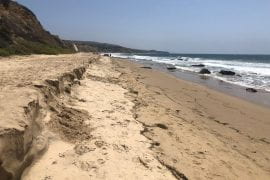New techniques to measure coastal topography will improve understanding of flood risk
Latest News
Squid skin-inspired material a game changer
Alon Gorodetsky’s lab creates wrappable substance with amazing insulation properties – and potential commercial use
Microbes Clean Up!
Fertilizer runoff is a significant source of water pollution. Matthew Reid looks to woodchip bioreactors modeled on nature to solve the problem.
Biofuels: A Third Act for Your Leftovers
Food and other organic waste play a major role in global warming. Nazih Kassem wants to turn that around and convert organic waste into an asset.
Grad-Faculty Team Restores C2C Bus Service
With funding from the Research Division, a Cornell team created a new COVID-era air filtration system for the university’s campus-to-campus buses.
Troubled Waters: Microplastic Pollution
Lisa Watkins analyzes streams and engages communities to reduce the plastic from clothes, grocery bags, and other products in our waterways.
Bacteria, Can’t Keep Them Down
How do bacteria continue to evade death by antibiotics? Guillaume Lambert applies physics to the task of discovering how.
Cornell to Lead Air Force Research Hub
The Mid Atlantic AFRL Regional Hub adopts a new research paradigm to advance technological innovation and economic growth.
Digital Dialogue with Plants
A new $25M Cornell-led center is developing technologies to remotely sense a plant’s biology and its immediate ecosystem for improved crop management.
Creating Materials That Mimic Nature
Meredith Silberstein thinks outside the box to create polymers with targeted functionality. Many of the concepts she explores are bio-inspired.











